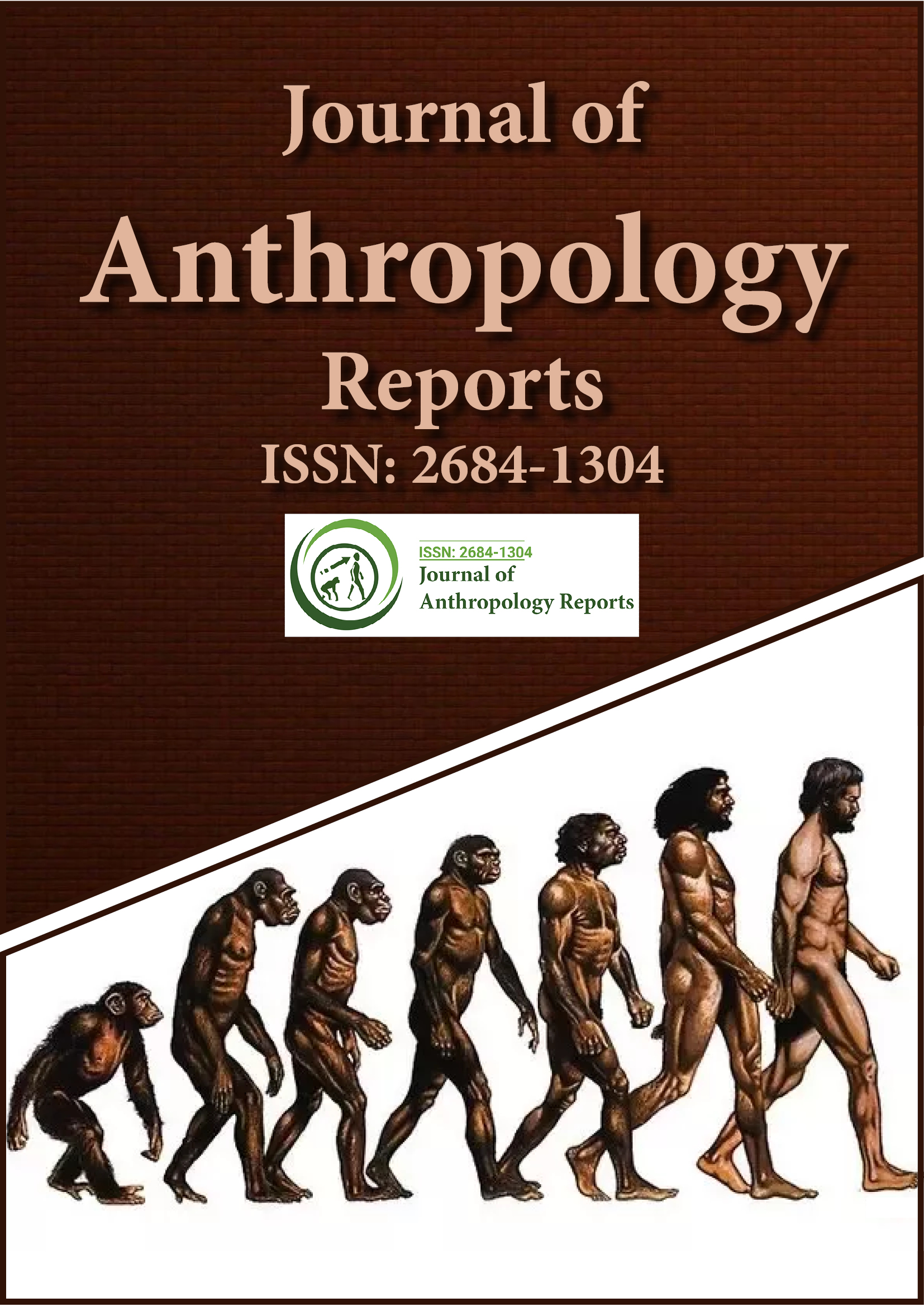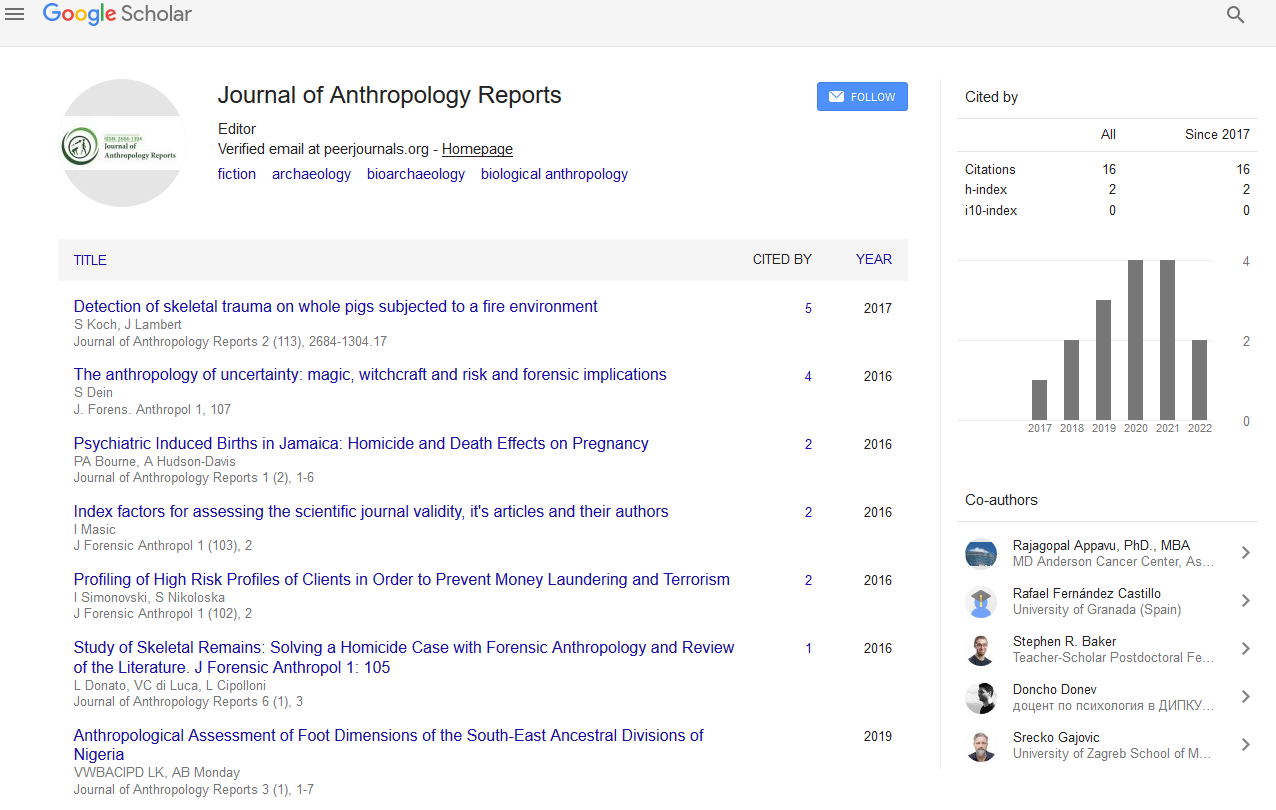Indexed In
- RefSeek
- Hamdard University
- EBSCO A-Z
Useful Links
Share This Page
Journal Flyer

Open Access Journals
- Agri and Aquaculture
- Biochemistry
- Bioinformatics & Systems Biology
- Business & Management
- Chemistry
- Clinical Sciences
- Engineering
- Food & Nutrition
- General Science
- Genetics & Molecular Biology
- Immunology & Microbiology
- Medical Sciences
- Neuroscience & Psychology
- Nursing & Health Care
- Pharmaceutical Sciences
Perspective Article - (2024) Volume 7, Issue 1
Cultural Diversity: The Essence of Anthropological Inquiry
Evelyn Sinclair*Received: 05-Mar-2024, Manuscript No. JFA-24-25376; Editor assigned: 07-Mar-2024, Pre QC No. JFA-24-25376 (PQ); Reviewed: 21-Mar-2024, QC No. JFA-24-25376 (QC); Revised: 28-Mar-2024, Manuscript No. JFA-24-25376 (R); Published: 04-Apr-2024, DOI: 10.35248/2684-1304.24.7.190
Description
In a world marked by globalization and interconnectedness, the study of anthropology becomes increasingly vital. Anthropology, as a discipline, delves into the complexities of human societies, cultures, and behaviors, explaining on the large combination of diversity that characterizes our species. Yet, amidst the most of cultures and traditions, there exists a fundamental unity that binds humanity-a shared heritage of resilience, creativity, and adaptability.
At its core, anthropology is a celebration of diversity. It encompasses various subfields, including cultural anthropology, archaeology, biological anthropology, and linguistic anthropology, each offering unique perspectives on the human experience. Through ethnographic research, archaeology excavations, biological analyses, and linguistic studies, anthropologists resolve the difficult of human existence across time and space.
One of the most compelling aspects of anthropology is its ability to challenge ethnocentrism-the tendency to judge other cultures through the lens of one's own cultural norms and values. By immersing themselves in unfamiliar cultural contexts, anthropologists gain insights into alternative ways of life, encouraging empathy and cross-cultural understanding. This empathetic approach is important an increasingly interconnected world where cultural misunderstandings can lead to conflict and division.
Anthropology also confronts stereotypes and misconceptions by providing complicated interpretations of cultural practices. For instance, rituals and customs that may seem strange or irrational to outsiders often hold deep symbolic meanings within their respective cultural contexts. By exploring the underlying significance of these practices, anthropologists debunk stereotypes and encourage appreciation for the diversity of human expression.
Moreover, anthropology serves as a dominant tool for social justice and advocacy. By documenting the experiences of marginalized communities and highlighting structural inequalities, anthropologists contribute to efforts aimed at promoting human rights and equality. Whether studying indigenous land rights, refugee resettlement, or gender dynamics, anthropologists play a vital role in amplifying the voices of those whose stories are often overlooked or silenced.
In recent years, the field of anthropology has faced criticism for its colonial legacy and its role in perpetuating unequal power dynamics. Critics argue that early anthropologists often exoticized and objectified non-Western cultures, reinforcing narratives of cultural superiority. However, contemporary anthropology has undergone a change of opinion, grabbing a more reflexive and ethical approach to research. Today, anthropologists strive to collaborate with local communities, prioritizing their agency and perspectives in the research process.
Furthermore, anthropology has increasingly embraced interdisciplinary collaborations, recognizing the interconnectedness of human phenomena. Collaborations with fields such as sociology, psychology, environmental studies, and public health have enriched anthropological research, offering holistic insights into complex social issues. This interdisciplinary approach is essential for addressing pressing global challenges, from climate change and biodiversity loss to pandemics and social inequality.
As we navigate the complexities of the 21st century, anthropology remains as relevant as ever. In a world grappling with cultural tensions, environmental degradation, and social injustice, anthropology Influence a reminder of our shared humanity and our capacity for resilience and adaptation. By grab the cultural diversity and promoting cross-cultural understanding, anthropology paves the way for a more inclusive and harmonious world.
In an era marked by globalization and rapid social change, the importance of anthropology cannot be overstated. Its holistic approach to understanding human societies, past and present, offers invaluable insights into the complexities of our shared existence. By promoting cultural humility, interdisciplinary collaboration, and ethical engagement with diverse communities, anthropology has the potential to connect divides and encourage a more inclusive and equitable world. As we confront the challenges of the 21st century, let us heed the call of anthropology-to embrace diversity, cultivate empathy, and work towards a future where all voices are heard and respected.
Conclusion
In conclusion, anthropology is not merely an academic activity; it is a call to action-a call to embrace diversity, encourage and strive for social justice. As anthropologists, it is our responsibility to challenge stereotypes, amplify marginalized voices, and advocate for positive change. By celebrating the richness of human cultures and promoting dialogue across boundaries, anthropology has the power to transcend divisions and unite us in our common humanity.
Citation: Sinclair E (2024) Cultural Diversity: The Essence of Anthropological Inquiry. J Anthropol Rep. 7:190.
Copyright: © 2024 Sinclair E. This is an open-access article distributed under the terms of the Creative Commons Attribution License, which permits unrestricted use, distribution, and reproduction in any medium, provided the original author and source are credited.

